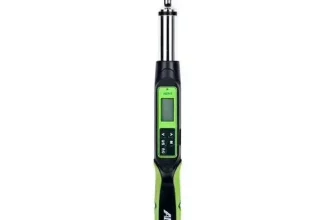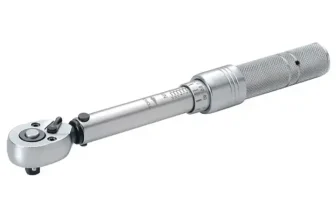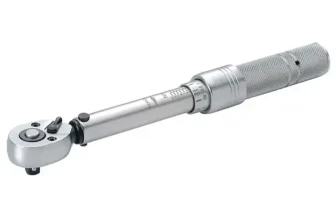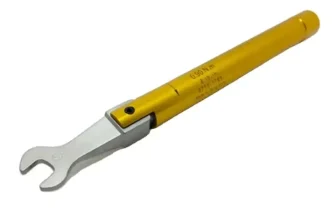A torque wrench is a specialized tool engineered to apply a specific
amount of force to a fastener, such as a nut or bolt, thereby ensuring
it is not too loose or too tight. The importance of this lies in the
principle of torque, a measure of the force that can cause an object to
rotate about an axis. Unlike a regular wrench, a torque wrench allows
you to control and measure the amount of force you apply, preventing
over-tightening and under-tightening which can cause damage and
instability respectively. Used in a large number of fields, ranging from
automotive repair to aerospace engineering, this tool is essential for
any task where the tightness of screws and bolts is crucial.
Importance of
using the appropriate torque wrench
The use of the appropriate torque wrench is of utmost importance in
various applications that require precision and reliability. By using
the correct type of torque wrench, you ensure that the bolts and nuts of
your project are tightened to the perfect tension, thus preventing them
from being either under-tightened which may cause loosening over time,
or over-tightened leading to stripped threads, both of which can lead to
catastrophic failures. Furthermore, using the appropriate torque wrench
promotes the longevity of your equipment, providing a secure and safe
work environment. It also upholds the integrity of the project at hand,
making sure that everything functions as it should for a longer period.
With different types of torque wrenches available in the market,
understanding their correct use and operation can save you not only time
and money but also maintain equipment safety standards.
Beam Type Torque Wrench
Description
and functions of Beam Type Torque Wrench
The Beam Type Torque Wrench is one of the oldest and simplest forms
of torque wrench. It features a long lever arm that extends from the
handle and a smaller beam that is affixed to the head of the wrench. In
the center of all this, a scale is marked to measure torque when force
is applied to the handle.
Technically speaking, as the handle is pulled, the main lever arm
bends slightly while the smaller beam, intimately connected to the head,
stays straight. This difference in movement between the two allows the
scale to accurately represent the amount of torque being applied.
Functionality-wise, it’s primarily used to measure and apply a
specific amount of force to a fastener, such as nuts or bolts, which
enables the correct tension and loading. This ensures that components
are neither too loose (risking movement or detachment) nor too tight
(causing potential stripping or breakage). The Beam Type Torque Wrench
is particularly useful in areas such as the automotive industry, where
specific torque settings are necessary for certain parts to ensure
safety and efficiency.
Quando and where to use Beam
Type
The beam type torque wrench is ideal for tasks that don’t require
exceptional precision, but do necessitate a good understanding of how
much force you’re applying. It’s a great tool for home mechanics or
beginners who are learning their way around an automotive engine, due to
its simplicity, ease of use, and affordability. These wrenches are often
used for lug nuts on car tires, installing spark plugs, and other
automotive work with high torque demands. The beam type can also be a
favored choice for working with machinery or constructions that involve
larger bolts and fasteners. The key is not to use them in instances that
require a highly precise, preset torque value.
Click Type Torque Wrench
Explanation
and uses of Click Type Torque Wrench
The click type torque wrench is perhaps the most common type and is
widely used by both professionals and do-it-yourself enthusiasts. Its
name comes from the distinct click sound it produces when the desired
torque value is reached.
This wrench operates on the principle of deflection. As torque is
applied to the bolt or nut, the wrench deflects, causing a metal lever
inside to give way at a certain torque value, hence the click noise.
This alerts the user to stop applying force to prevent over-tightening,
which could potentially damage the bolt or the wrench itself.
The click type torque wrench is adjustable, allowing users to set a
specific torque value before starting their work. With its high level of
accuracy, this tool is perfect for automotive applications, where
precise control over torque is necessary. It is also commonly used in
the construction and assembly of bicycles, home appliances, and
furniture.
Besides, the design of the click type torque wrench ensures durable
and dependable tool performance. This sturdy wrench can sustain an
intense degree of hard usage, making it ideal for heavy-duty
applications. Accuracy coupled with endurance, assures that the click
type torque wrench will reliably deliver the right amount of torque,
preserving the integrity of the components being worked on.
Advantages and
disadvantages of Click Type
Click type torque wrenches hold several advantages that make them
appealing to users. For one, these wrenches are widely known for their
precision and consistency. They emit a distinctive click sound to
indicate when the desired torque level has been reached, minimizing the
risk of overtightening or undertightening. This feature allows for a
high degree of accuracy, which is crucial in ensuring that all fasteners
are torqued appropriately and evenly.
Additionally, click type wrenches are easy to use and read,
especially for beginners. Most models come with dual scale measurements,
enabling users to read measurements in either foot-pounds or Newton
meters. The setting can be adjusted easily, often by pulling down on a
lock and rotating the handle until the desired setting is reached. With
an easy-to-grip handle and simple operation methods, click type wrenches
offer an ideal combination of comfort and usability.
Despite these strengths, click type torque wrenches are not without
their drawbacks. One such disadvantage lies in their sensitivity to wear
and tear. Prolonged use without proper maintenance may cause the
internal mechanism to deteriorate, leading to inaccuracies in torque
settings. Regular calibration is necessary to maintain precision and
effectiveness over time.
Furthermore, click type torque wrenches require a careful ear. The
“click” sound that signals the intricate torque has been achieved isn’t
always loud, and may be missed in noisier work environments. Users must
pay close attention to prevent overtightening or damage to the wrench or
components being worked on.
Lastly, compared to some other types of torque wrenches, these models
can be priced slightly higher due to their internal complexity. However,
many professionals and DIY enthusiasts find the investment well worth it
for the level of control and precision these tools offer.
Dial Type Torque Wrench
Overview
and applications of Dial Type Torque Wrench
The Dial Type Torque Wrench is perhaps one of the most accurate types
and is widely utilized in professional automotive and industrial
applications where precision is key. This type of wrench features a dial
that shows the torque level being applied to the nut or bolt; it allows
the user to witness real-time torque application, which significantly
enhances accuracy.
For its application, the Dial Type is often used in scenarios that
require a precise amount of torque like in automotive repairs, aircraft
maintenance and assembly line work. Owing to its precise nature, the
Dial Type Torque Wrench is also seen in laboratories and academic
research work where engineers need highly accurate measurements. Most
importantly, it’s the go-to wrench for tasks that could be dangerous if
a specific torque amount is not adhered to strictly.
Add to this the fact that the display remains unaltered after force
is applied, it keeps the applied torque display for record and quality
purposes. Therefore, it is excellent for applications that require
post-process documentation or if you’re curious about the pressure you
applied after the fact.
On the whole, the Dial Type Torque Wrench is an excellent tool when
exactitude in torque measurement is paramount.
Pros and cons of Dial Type
The Dial Type Torque Wrench highlights some unique advantages and
disadvantages. On the pro side, this type of wrench is well-regarded for
its impressive precision. It provides the most accurate torque reading
compared to other types, making it the preferred choice for
precision-sensitive tasks in industries such as automotive and
aerospace. Furthermore, the Dial Type Torque Wrench is often
bi-directional; this offers convenience to the user as it can measure
torque in both clockwise and anti-clockwise directions.
However, like every tool, it has its set of drawbacks. The most
prevalent one is its expense. Dial Type Torque Wrenches are typically
pricier than their counterparts, due to the precise mechanism they
incorporate. Another challenge with these wrenches is their relative
fragility. The dial component is quite sensitive and prone to damage if
not handled or stored carefully. They also require a steady eye to read
accurately as the precise measurements may be hard to read especially in
dim light or awkward positions. Hence, they may not be the best option
for rough or heavy-duty applications or for those who struggle reading
small print.
Electronic Torque Wrench
Features and
benefits of Electronic Torque Wrench
Electronic torque wrenches, a modern mainstay in many toolkits, come
packed with a wide array of features that benefit users in numerous
ways. Designed for absolute precision, these wrenches typically have a
digital display that clearly exhibits the torque value. This kind of
easy-to-read LCD screen makes setting and verifying the torque
relatively simple and allows for enhanced accuracy.
What sets the electronic wrench apart from its peers is its ability
to store readings. This feature is incredibly beneficial when tracking
and auditing torque events becomes critical in industries like aerospace
and automotive. Some advanced models even offer dual direction torque,
enabling users to measure clockwise and counterclockwise readings.
Moreover, these tools have auditory and visual indicators that alert
the user when the desired torque is achieved. This prevents
over-torqueing, thus reducing the risk of damaging parts. With their
potential for programmable pre-set torque settings, they further
simplify repetitive tasks.
One of the most appealing features is the ergonomic design of
electronic torque wrenches. Built for comfort, these tools often reduce
hand and wrist fatigue, making them a solid option for projects
requiring extended use.
Though they demand a higher price point, their accuracy,
user-friendliness, and advanced technology make electronic torque
wrenches a worthwhile investment for hobbyists and professionals alike.
In essence, these wrenches offer a seamless blend of traditional
mechanical function with digital convenience and precision.
Scenarios for
using Electronic Torque Wrench
An electronic torque wrench is perfect for scenarios that require
both precision and documentation. In the automotive industry, for
example, electronic torque wrenches make tasks like tightening head
bolts to a vehicle’s specific torque setting more accurate, ensuring
safety and efficiency.
Moreover, these wrenches are a common choice for assembly lines and
mass production, where consistency is key. Their capacity to provide
digital readouts and have programmable settings makes them perfect for
repetitive jobs with specific torque requirements.
Diverse industries such as aviation, space exploration, and heavy
machinery also frequently utilize electronic torque wrenches. Their use
in these fields is a testament to the precision required, as a slight
variance in torque can lead to significant consequences in terms of
safety and reliability.
To sum it all, anywhere you need accurate, repeatable, and
documentable torque measurements, an electronic torque wrench fits the
bill.
Preset Torque Wrench
Introduction to Preset
Torque Wrench
The Preset Torque Wrench, as the name implies, is a tool specifically
designed for those that need to apply a specific amount of torque and
have little room for error. This wrench type comes calibrated from the
factory with a pre-set torque value that cannot be adjusted, making it a
popular choice for manufacturing lines or repetitive tasks where
consistency is key. The key selling point of this tool is its foolproof
nature – once the pre-set torque value is reached during operation, the
wrench automatically slips or breaks away, preventing from
over-tightening. This makes it easier for even novices to achieve
accurate torque application every single time.
Understanding
when and where to use Preset Torque Wrench
The Preset Torque Wrench is a master in precision. They shine when
specific torque settings are crucial, and any deviation could lead to
damage or poor assembly. Designed to deliver a predetermined level of
torque, preset torque wrenches are extensively used in production lines
and industries where a consistent torque delivery is mandatory.
Notably, these are commonly utilized in the automotive industry,
manufacturing units, and construction sites where the margin for error
is minimal to none. They’re ideal for jobs where the same precise torque
setting needs to be applied over and over, like tightening lug nuts on a
car assembly line or securing fasteners in an aviation module.
Some scenarios that warrant their usage include bicycle assembly,
automotive repairs, mechanical maintenance tasks, and assembly lines
where the fastening operation demands a repeat specific torque value.
The preset torque wrench is a reliable tool when precision and
consistency are paramount.
Buying Tips
Factors to
consider when buying a torque wrench
When buying a torque wrench, several factors need to be taken into
account to ensure you make the right choice.
Firstly, consider the quality of the tool. This is paramount as it
directly impacts the wrench’s lifespan and overall performance. Look for
a torque wrench made from high-strength materials, with robust
construction and reputable workmanship.
Secondly, take into account the type of torque wrench you need. This
will be determined by your specific uses and tasks. For tasks needing
precision, consider a click type, dial type, or electronic torque
wrench. If ease of use and budget are key considerations, a beam type
might be the best choice.
Next, review the torque range that the wrench offers. It’s best to
choose a wrench where your necessary torque setting falls in the middle
of the torque wrench’s range. And remember, a torque wrench that has a
wide range will provide greater flexibility, but might not be as
accurate for lower settings.
Another substantial factor is the wrench’s scale visibility. You must
be able to easily read the torque values, even in low light conditions.
It’s also better if the scale shows readings in both ft-lbs and Nm for
added convenience.
Finally, comfortable grip and length should not be overlooked. These
affect the ease of use and efficiency during operation. Don’t forget to
consider the customer service and warranty offered by the manufacturer.
Renowned brands often offer better aftersales service than lesser-known
competitors.
Keep in mind these factors to choose a torque wrench that not only
can cater to your specific needs but also provides the best value for
money.
Recommended brands/products
In the world of torque wrenches, several high-quality brands have
stood the test of time for their durability, accuracy, and
functionality. Here are three top brands worth considering if you’re in
the market for a torque wrench:
-
Tekton: Tekton has a reputation for producing robust and durable
torque wrenches. Their Click Torque Wrench is particularly popular,
offering high-precision readings that meet calibration standards.
Perfect for automotive, industrial, or home use, Tekton torque wrenches
are a reliable choice. -
GearWrench: Renowned for its excellent craftsmanship, GearWrench
is a leading brand in the motor industry. They produce a range of
precise, easy-to-attempt and long-lasting torque wrenches. Their ½ Inch
Flex Head Dial Type Torque Wrench is often highly rated for its accuracy
and even has a glowing review from ANSI, the American National Standards
Institute. -
CDI: A subsidiary of Snap-on Incorporated, CDI is known for its
high-quality production of torque products. Their Electronic Torque
Wrenches are incredibly accurate and have features like an audible alert
when the desired torque is reached. Reliable and easy to use, CDI’s
torque wrenches are ideal for professionals seeking supreme
quality.
While these three brands shine brightly, your torque wrench selection
should ultimately depend on your specific needs and budget. Make sure to
research thoroughly, read customer reviews, and consider the warranty
options offered by each brand to ensure you’re making a sound
investment.
Conclusion
Recap of the torque wrench
types
In our journey through the world of torque wrenches, we have explored
various types, each with their unique features and applications. We
kicked off with the Beam Type Torque Wrench, a basic and affordable tool
that provides direct readings of torque but requires a keen eye. The
Click Type torque wrench came next, celebrated for its ‘click’ alert
system once the set torque is reached, but panned for sometimes lacking
in accuracy.
Then we arrived at the Dial Type Torque Wrench, an accurate tool with
a visible dial display, however this comes at a higher cost. Following
this, we spotlighted the Electronic Torque Wrench, which boasts digital
display and alerts, but requires frequent calibration. Lastly, we
discussed the Preset Torque Wrench used to achieve specific torques,
with its main disadvantage being limited to a preset torque value.
After understanding these various tools, it’s clear that the ideal
torque wrench greatly depends on your needs and applications. Whether
you’re a professional mechanic working in an advanced auto repair, or a
home craftsman looking to do some DIY, there’s a torque wrench that’s
just right for you. Make sure to be considerate while buying and choose
a wrench that suits your work and budget best. Remember, accuracy and
comfort go a long way to ensuring your work is effective and
efficient.
Final words and advice
Choosing the right torque wrench can make a significant difference in
ensuring the proper tightness of bolts in various applications. It’s
important to understand each wrench type’s features and benefits to
select the suitable one for your needs. Remember, not all torque
wrenches are created equal and choosing the wrong one could lead to the
over-tightening or under-tightening of bolts causing damage. Always
adhere to manufacturer’s guidelines to prolong the lifespan of your
wrench and ensure safe usage. Also, remember to regularly calibrate your
torque wrench to maintain accuracy. We hope this guide will assist you
in making an informed purchase decision. Keep in mind, investing in a
quality torque wrench is an investment in precision and safety.







